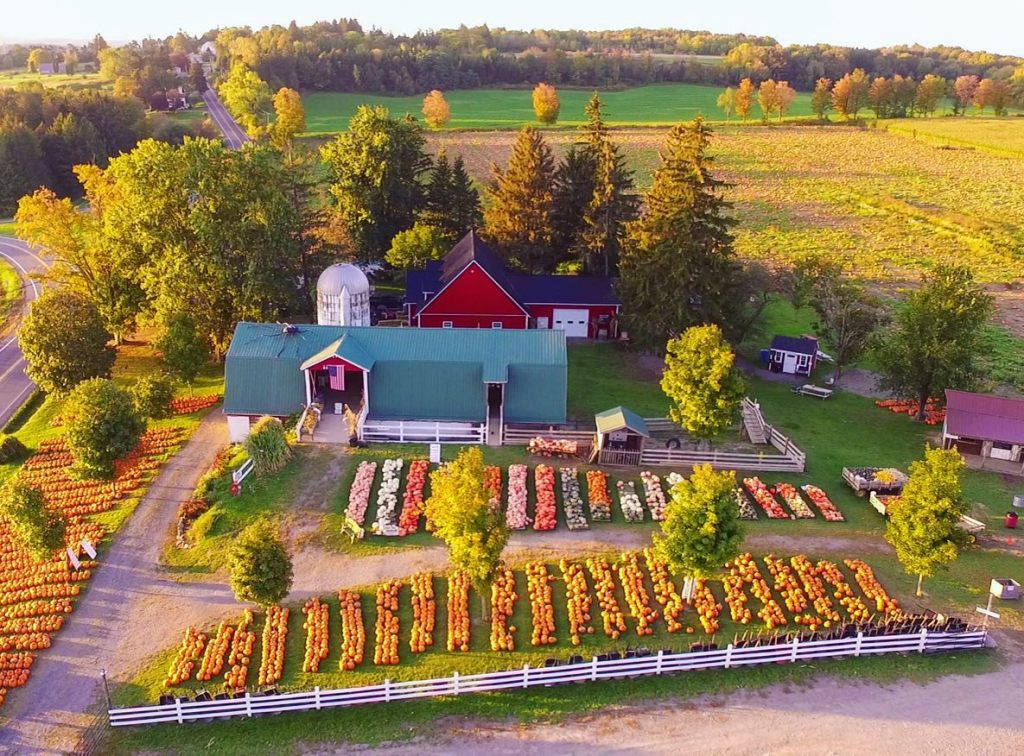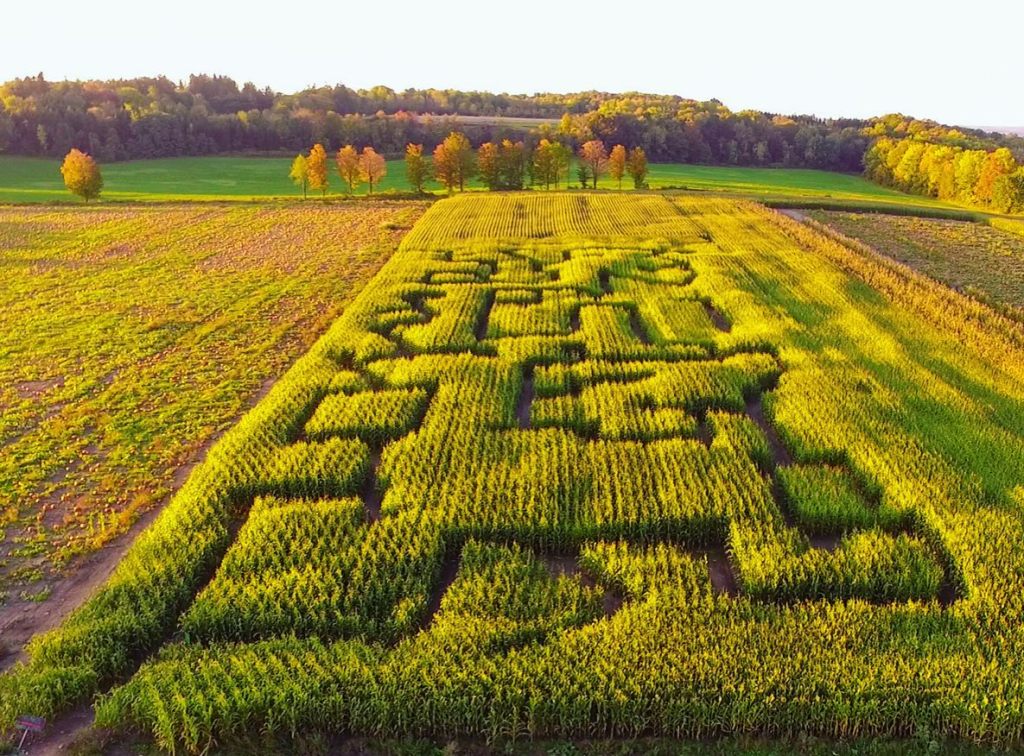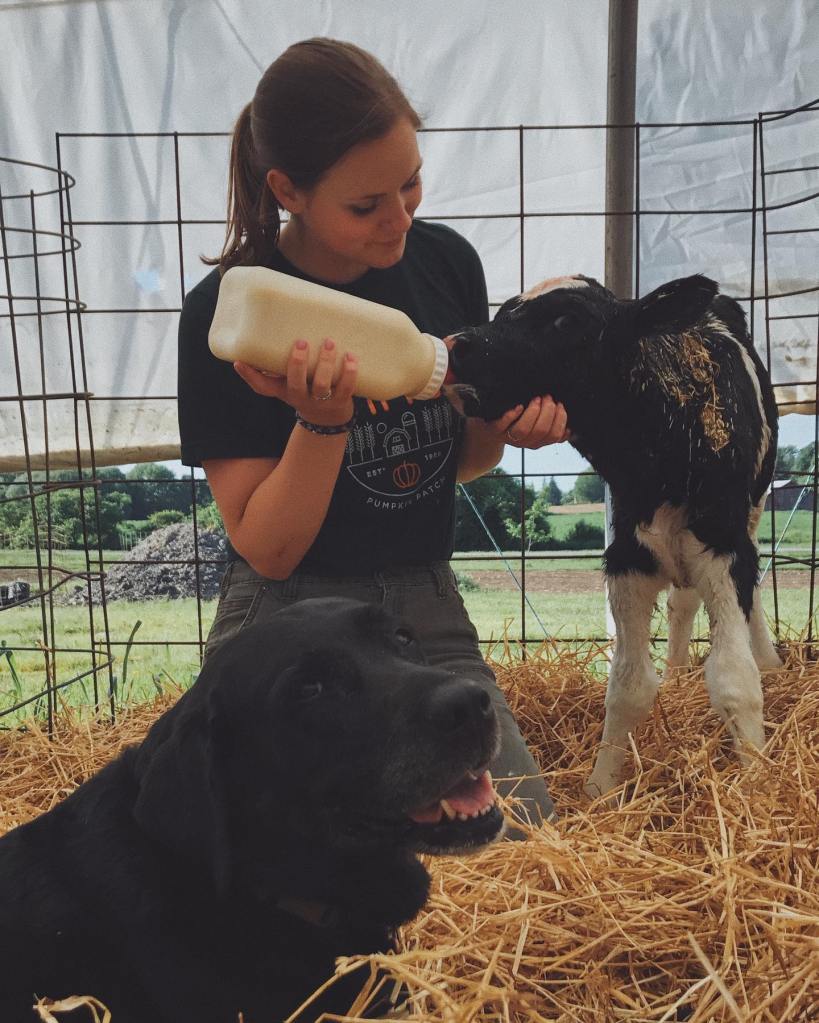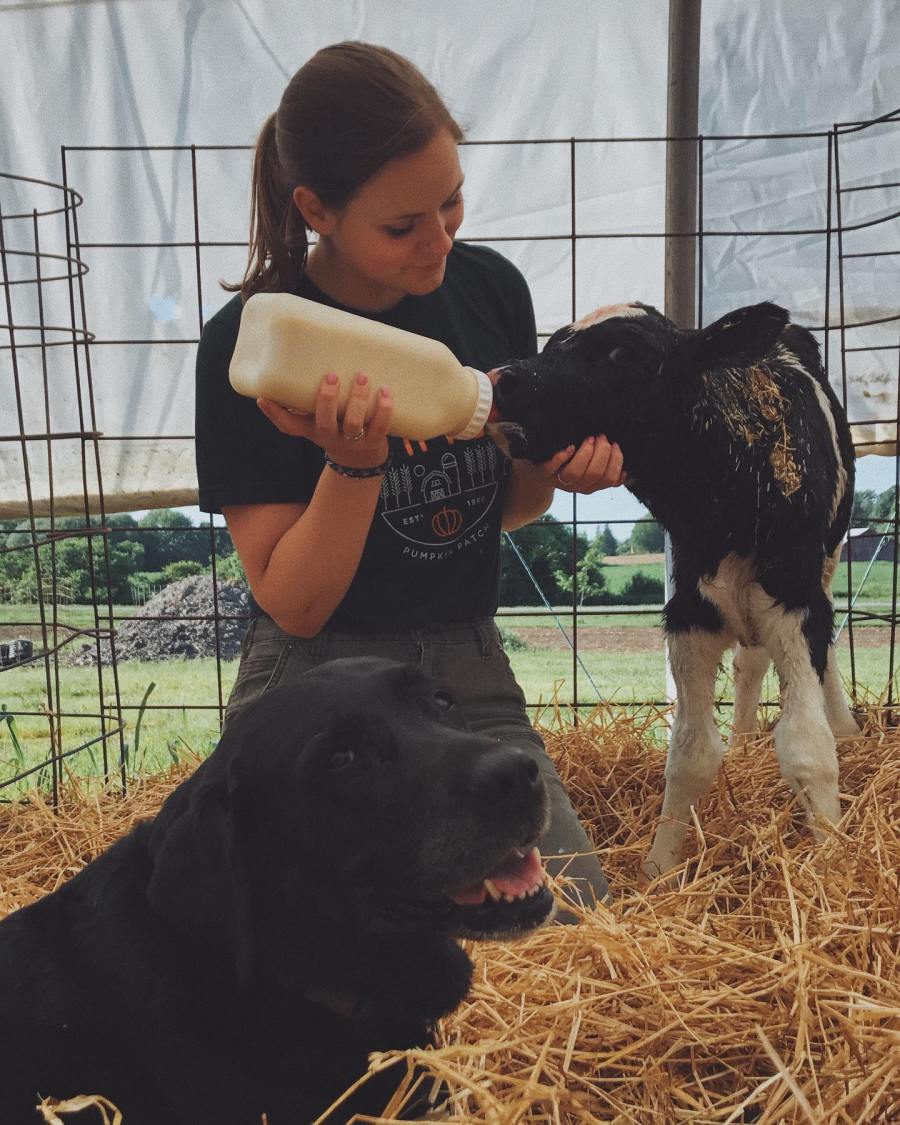
I grew up in the rolling hills of Upstate, New York, where many beautiful farms dot the landscape. My grandfather built silos for all the local farmers and I even played on a small dairy farm down the road as a kid. It’s fair to say that I have a soft spot for farmers.
So when I heard that famers are committing suicide at an alarming rate, I reached out to my friend and high school classmate Erica. Erica is a farmer, business owner, counselor to the farming community, owner of Tim’s Pumpkin Patch, and a wife and mom to three adorable girls who run a farming Instagram page. I figured that Erica would know what’s really going on.
I was right.
Erica has warm brown eyes and a friendly and laid-back demeanor. She is always upbeat and positive. But behind her ready smile is a burden she carries for all the farming families she talks to around New York state. These farmers are really struggling right now and facing increased pressure, depression, and even suicide. Erica tells us what’s really going on and how we can support them.
Erica, tell me a little bit about your farming background so that people know you are the real deal.
I grew up on a small 100 cow dairy farm in Onondaga County, New York. I am the second of four sisters. My father is the second of four brothers, all of whom have their own dairy farms. My husband is a partner with his siblings in their dairy and grain farm operation. They milk about 550 cows and grow around 2100 acres of corn, wheat, soybeans and hay. My husband and I also own and operate Tim’s Pumpkin Patch with our three daughters. Our pumpkin farm business is a pick your own agri-tainment farm including a farm bakery and brewery.


You also work part-time with farmers. Tell me about that.
I have my Masters degree in Social Work from Syracuse University. About 15 years ago, I learned about an organization called NY FarmNet based out of Cornell University. I can utilize my background in social work, as well as my own life experiences growing up on and operating a farm business, to help other farm family businesses. I have been doing consulting work for NYFarmNet for almost 8 years.
What are you consistently hearing from the farmers you interact with?
That it is too expensive to produce milk for the prices they are getting paid for it. Most recently, the newly elected democrats in New York are trying to pass new labor laws that will dramatically effect farmers. They want farm workers to get paid for overtime and be able to unionize. These laws have passed and will take effect January 1, 2020.
New York State farm families are facing the worst economic conditions since the farm crisis of the 1980s. Farm families’ heritage, identity, pride, and finances are tied directly to the farm. And yes, it’s costing more to produce milk than farmers are getting paid for it. I have a client right now, his banker just told him to get on food stamps! That is the last thing a farmer would do. The long hours they are putting in, as they cut back on employees, equipment failing (that they can’t afford to upgrade), and the biggest stressor for them is that they might be the generation that loses it all. I was at a farm a few months ago where the farmer was suicidal. He had just found out that he is going to have to sell his farm.
On that note, I read that the suicide rate among farmers is increasing. Why?
Dairy farms, especially small dairy farms (200 cows or less) are going out of business at an alarming rate. These farms have often been in the family for generations. The burden is too much to bear for a farmer to be the last generation to lose the farm. Stress levels are extremely high. This often leads to depression. Farmers by nature are often very unlikely to ask for help, especially mental health help. Depression can lead to suicide if left untreated.
I originally interviewed you about six months ago and you were concerned about the farming community back then. Has it gotten any better or worse in the last six months?
I feel that stress levels are starting to go down, especially because milk prices are starting to increase. However, in New York, the labor law legislation did end up passing so there may be added stress as the pressures to comply will create more financial strain on farmers.
To read more about the pressures facing farmers, including suicide rates, click here: epublic.com/article/153604/work-suicidal-farmers-its-becoming-much-bear.
How can we support farmers right here, right now? What is one action-item we can take away from this interview?
Do not rely on google and youtube to get your information about farming and agriculture. Animal rights activists have done very well at dispensing false information about animal agriculture on the internet, which is very triggering to the general public. Follow actual farmers on social media who tell the true story of what really goes on in agriculture. And buy milk and other dairy products!
Can you describe the role of the Federal government in the agriculture community (in other words, setting milk prices, subsidies, bailouts)?
Many people think that the United States government subsidizes Agriculture. The reality is the consumer is subsidized. According to the article below and as an example, Americans spend just 6.4% of their household income on food. https://www.weforum.org/agenda/2016/12/this-map-shows-how-much-each-country-spends-on-food/. Food is very inexpensive in the US and so called subsidies to farmers artificially deflate consumer prices. Historically, the United States was more involved in setting agricultural prices. The passage of the 2012 Farm Bill eliminated and or made significant progress toward the elimination of direct payments. Direct payments are replaced with crop insurance. Farmers purchase insurance to protect against price validity; similarly, consumers purchase car insurance in the event of a car accident. Form more information: https://www.extension.purdue.edu/extmedia/EC/EC-774-W.pdf
Are farmers heavily subsidized?
I would not say farmers are heavily subsidized, and farmers do not want hand-outs at all. They want a fair price for the work they put in to produce the safest, healthiest foods on the planet. The government steps in to help farmers because Americans are used to cheap food! There are certain programs that the government supports such as crop insurance, and premiums are subsidized by the federal government. Then most recently, 11 billion dollars was handed out to farmers, which they called it “Tariff money” from President Trump’s trade renegotiations. Look on the website www.weforum.org to see what percentage of income different countries spend on food. We are so spoiled in this country!! You can also check out this article: https://www.fsa.usda.gov/programs-and-services/Dairy-MPP/index
Describe other ways that farmers can make money.
The pumpkins are a money maker for us. If they weren’t, it would be a hobby! 🙂 Farmers who are diversified and produce other goods besides milk have an advantage when times are tough. Anything from Maple syrup, to a sawmill, pumpkins, apples, beef cows, etc. Farmers get pretty creative when they need to bring more money in. That’s where hops, hemp, cannabis comes in — diversification.
What do you think of President Trumps policies towards farmers?
President Trump is putting his best foot forward to protect all American businesses. Unfortunately or fortunately, US agriculture is dependent upon exports. We produce a commodity product meaning corn from Brazil is the same as corn from the US. China and other countries are now purchasing corn from Brazil vs the US. US farmers are feeling much short-term pain. In theory, this should only be short-term.
Why is the biggest misconception about farmers or farming?
The average American is about three generations (about 100 years) removed from farming. Therefore, there is a huge knowledge gap about modern dairy farming. Consumers only recently starting paying attention to how their food is produced. Consumers became alarmed and upset when they learned about modern dairy farming. They created the demonizing term “factory farms.” Farmers are extremely efficient and always adapting. The way that we farm now looks nothing like it did when great grandma and grandpa farmed.
Will there ever be a food shortage?
There already is. Food deserts exist in every part of the country. Why would I operate a retail store in rural America if I’m not profitable? Why would I deliver food to a rural retail store if it is not profitable to deliver food to a retail store? The most efficient business will survive. I just hope those businesses outlive the unhealthy consumer living in the food deserts.
(Heather’s note: a food desert is defined as parts of the country without fresh fruit, vegetables, and other healthful whole foods, usually found in impoverished areas. This is largely due to a lack of grocery stores, farmers markets, and healthy food providers.)
Briefly describe your farm: what do you grow? You also have a dairy farm, please describe that. Tell me about Tim’s Pumpkin Patch.
At our farm we milk about 550 cows and have around 1000 cows in total. We also grow 2100 acres of corn, soybeans, wheat and hay. At Tim’s Pumpkin Patch, it is 65 acre pumpkin farm – 30 acres is for pick-your-own and 35 acres is used for our displays and wholesale orders. We also grow about 30 different varieties of squash, gourds and decorative Indian corn etc. We have a farm bakery, farm brewery, and several activities for our visitors. We have always tried to keep the activities agricultural, such as visiting with farm animals, hay/corn mazes etc. We also have about an acre of asparagus.
What do you love about Tim’s Pumpkin Patch? What do you dislike?
I love the fact we’ve been able to raise our girls in the business. They watched their parents work hard and now they know how to work hard. They have an incredible work ethic and critical thinking skills that is hardly seen in the average teenager today. I also love that Tim’s is a happy place, where people come to make memories. I love that we get to be a part of that. We just celebrated our 33rd season!
I think when I was younger, my dislike list would’ve been a lot longer than it is now. Things like being in a weather dependent business, people who steal from us, managing over 30 teenage employees (herding cats), those are all things that present challenges. Now I just look at those challenges as a part of the business that needs to be dealt with.
What do you think of Hemp Farms and marijuana farms?
I think right now there is a “goldrush” mentality in NY amongst farmers who are looking for the next money maker. There are many factors that need to play out. Licensing, where to get seed, marketing, harvesting, product, and market flooding. We are sitting back on this one for now.
What is running a dairy farm like?
It has a lot of ups and downs physically and mentally. It is usually a lifelong commitment. You have to be extremely business minded.
What do you dislike about farming?
The fact it’s so weather dependent.

Please tell me about your girls.
Evelyn is 20 years old and in her junior year at SUNY Cobleskill. She is planning to graduate early doubling up on all of her classes. She is currently searching for an internship in the south. Evelyn is most interested in communications, marketing and social media in agriculture. Claudia is 18 and a senior in high school. She has been accepted to Kansas State, Nebraska-Lincoln and Iowa State. She’s still waiting to hear from a few other colleges, but as you can see, she wants to be where the action is in the mid-west. Jojo is 15 and a freshman in high school. She works with Claudia at the farm and is very much involved in soccer.
They also have a huge following on Instagram. I’d say head on over there, because they have multiple posts that describe what they are up to. (You can find the girls on Instagram at nyfarmgirls. The girls have a whopping 31,100 followers!)
They also have a YouTube channel, Facebook and TikTok page where they advocate for the agriculture industry.
I understand your girls face a lot of criticism on Instagram. Why? And how do they respond to that?
The animal rights activists do not think that animals should be used in any way for human consumption. What I love about the girls’ Instagram page is that it’s very positive. They get a lot of criticism, but they remain positive and kind through it all.

⠀⠀⠀⠀⠀⠀⠀⠀⠀
After the Fair Oaks video came out last night I was so angry. Angry at a lot of things. First I was angry that management had no clue that was happening. I understand it is a big operation, but that means you should only be watching your employees more closely! Secondly, I was so disappointed in the employees that were harming the animals. It hurts to know that humans are capable of such horrible things. There is not an excuse in the world for the appalling treatment of those innocent animals. Lastly, (and the biggest reason) I was angry was because the people filming, who apparently love animals so much, didn’t do a thing. They let it go on for months without saying a word. Many are saying this was a set up by animal rights activists, in order to raise more money for their cause…but who knows. I know not everyone will be angry about this scenario but this is our take on it. It happened and it’s not a good representation of our amazing industry. Despite if it was a set up or not.
⠀⠀⠀⠀⠀⠀⠀⠀⠀
All we can do is continue to show love and care for our animals.”
When I was growing up I played on a family farm down the road. We had so much fun making mazes in hay bails and playing hide and go seek around the farm (I once hid in a milking vat!). What are some things farmers do for fun around the farm?
I think every farm family finds fun in their own way, or at least they should. That is the key. It can be difficult for farmers to get away so making time for fun is so important. When Tim was growing up his family would often stop for lunch and make a small campfire in a nearby woods and roast hot dogs. We continued that tradition when our kids were small. Any time the girls can incorporate having fun while they work, they do. Much of that can be seen in the videos that they make. Farmers are natural-born pranksters. Growing up we pulled a lot of pranks on the hired guys that worked at our farm. Once I put duct tape over this one guy’s headlights and then watched him drive down the road trying to figure out what was going on with his car. 😂


Last question: if you could speak for a farmer, what is the number one thing he or she would want all of us to know?
That farmers are just like anyone else. We love what we do, we love our families, and we love our country.

Heather’s closing thoughts: I’m very grateful for Erica’s time in giving this interview. We went to school together so I feel like I really know and trust her. Also very grateful for my now deceased Grandpa Art, who built silos and modeled an amazing work ethic (as all farmers do). Their work ethic is the best in the world, in my humble opinion. 👍
My hope is that, after reading this interview, you will support your local farmer, especially your local dairy farmer, as much as possible. Check in on them. Get to know them. See how they are holding up. Follow them on social media. Buy their milk and cheese and ice cream. They need our support as much as possible because they feed the world.
Thanks for reading and thanks for supporting the farming community!!
PS: One last article if you are interested: https://fortune.com/2019/06/11/farm-crisis-midwest-floods-2019/

Wow Heather! Great interview with lots of detailed information! I’m so very thankful for farmers! I can’t imagine the daily commitment and work involved (no days off)!
LikeLiked by 1 person
thank you for commenting!! You are so right! I could never do the job.
LikeLike
Thank you, Heather and Erica, for highlighting the uphill battle that farmers are constantly dealing with. It seems so unfair that the hardest working people (family farmers) are having to struggle just to make ends meet. We’ve seen many of the family dairy farms in our area go out of business in the past several years, it is heartbreaking.
LikeLiked by 1 person
Thank you! It is an uphill battle.
LikeLike